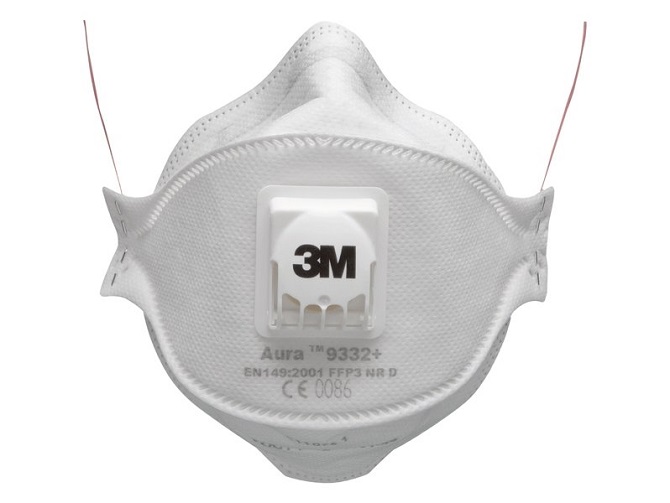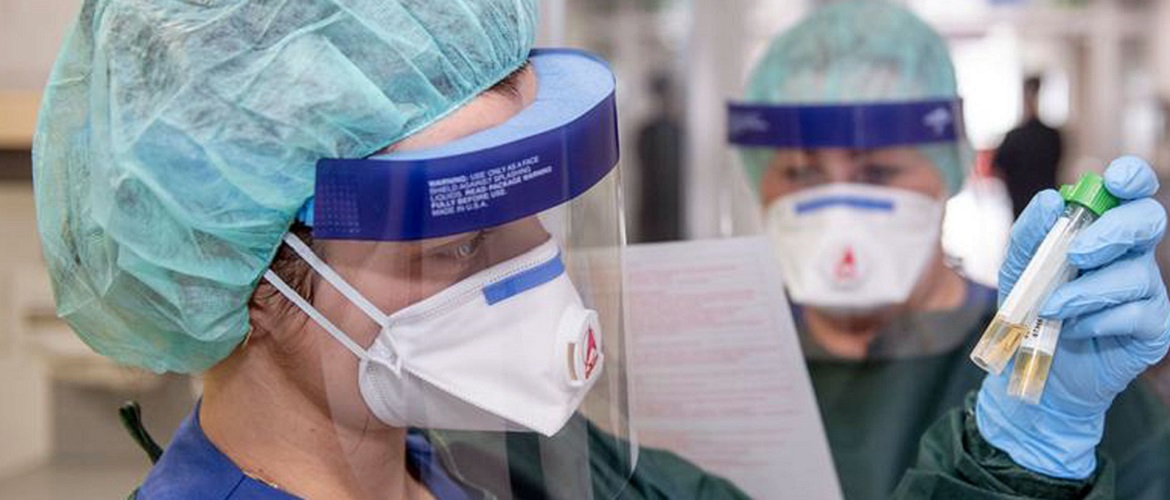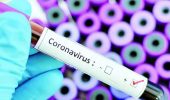The pandemic of the coronavirus COVID-19 has been announced in the world. There isn’t a single continent left on Earth, except for Antarctica, where cases of infection weren’t recorded. In total, more than 100 thousand people caught the illness, and more than 4 thousand died. But there is more to come. Coronavirus spreads exponentially.
The world media is constantly publishing news about the coronavirus. But how to prepare for it and protect yourself and your family? The large quantity and inconsistency of information on the Internet, makes the panic grow, and there are practically no specific recommendations on what to do. The editorial team of Joy-pup.com has collected the most important data on how to prepare for coronavirus and what protection methods are there. We will talk about protective masks and effective disinfectants that can be made at home. We’ll also share a recommended list of products in case of quarantine.

Masks from coronavirus – can you protect yourself?
The mask doesn’t shield from coronavirus hundred per cent, but it’s that important barrier that prevents the entry of bacteria and infections into the respiratory tract, as well as the spread of the virus. First of all, masks should be worn by sick people. But only specific masks can help healthy people avoid infection in public transport, shops, entertainment facilities and other places.
Important! Pay attention to an exhaust valve on the mask. If the mask doesn’t have it, then the effect of a double filter on inspiration and expiration is created. That means, that exhaled air is filtered, and a sick person wearing such a mask doesn’t infect others. If there is an exhaust valve, only inhaled air is filtered, so sick people shouldn’t wear it, because they will infect others!

Mask with an exhaust valve 
Mask without an exhaust valve
A regular medical maskfrom the pharmacy is ineffective in protecting a person from inhaling viral and bacterial particles. It can be used only by sick people, as a barrier to the spread of infections. But in this case, it is necessary to change the mask every 2-4 hours. It loses its properties after 20 minutes in continuous contact with an infected person.

As an illustration, let’s look at masks from the manufacturer Aura 3M
- Mask 3M Aura FFP1. It provides protection against dust and microdrops that a person releases with microorganisms when exhaling or coughing. It consists of three stripes, it can be customized to fit the shape of the face, adjusted to the contour of the nose and cheekbones. Due to its low protection class, such a mask, like a regular medical one, needs to be changed after 20 minutes of continuous contact with an infected person.

- Mask 3M Aura FFP2. It protects a person from smaller particles of dust and microorganisms. It fits well to the face and adapts to its shape.

- Маска 3М Aura FFP3 9332+. It gives protection against the smallest particles of dust, and also against viruses and pathogens. It can be used for a long time.

Protective masks have different types of filters: against gases or particles.
- Gas filters can’t protect against viruses and germs!
- Particle filters protect against viruses and germs, they have the abbreviation P1, P2 or P3, which indicates the class of this protection.
Important! You should buy only new masks, packaged in containers because unpacked masks lose their qualities. Microbes settle on them and you never know who used them before or where they were stored. It is very dangerous!
Кead the instructions иefore using the mask. The thing is that it must be worn correctly, otherwise there will be no effect from its use. So, the mask should fit flush with the face, cover the mouth and nose and fit the size of the person. Mask size 175 × 95 mm is recommended for adults, mask size 140 × 80 mm is recommended for children. The mask shouldn’t get wet, because then it loses its properties and becomes useless!
Compulsory disinfection: how to make disinfectant materials in case of their absence
Panic is growing in the world, and people are interested in the question of what medicines to stock up on coronavirus. Unfortunately, there is no effective single medicine against the disease! They treat it symptomatically, that is, medicines are selected depending on the presence of symptoms. So, your home medicine box should contain antibiotics, antiviral drugs, medicines for cough and runny nose. Don’t forget about the medicines that you constantly use.

But the most important remedy for protecting against coronavirus is the disinfectant. And not only for hands, but for the whole house. Because of the growing panic, there are almost no disinfectants in the pharmacies and stores throughout Europe, but don’t get upset too soon. You can make coronavirus disinfectants on your own.
Important! Pure alcohol can’t be used for disinfection, as it will simply dry the skin on the hands and lead to cracks and wounds. The best variant is to make a disinfectant gel.
Coronavirus Disinfectant №1
To make the gel you will need:
- Isopropyl alcohol 99.8%: 750 ml
- Hydrogen Peroxide 3%: 45 ml (optional)
- Glycerin 98%: 15 ml
- Boiled water: 190 ml.
Note: hydrogen peroxide is not absolutely necessary for the production of a disinfector. According to WHO, it only serves to destroy spores in used containers. Before use, the solution should be infused for 72 hours.
Coronavirus Home Disinfectant №2
You will need:
- Ethanol 96%: 830 ml
- Hydrogen Peroxide 3%: 45 ml (optional)
- Glycerin 98%: 15 ml
- Boiled water: 110 ml
How to make a mixture?
- Mix all ingredients in a tight pack and shake well.
How to apply?
- Put some home sanitizer on your hands and rub it thoroughly.
Important Note on Home Sanitizers
In its guidelines, WHO provides the following information:
- Sanitizers are suitable only for external use.
- Keep the disinfectant out of the reach of children.
- Avoid contact with eyes.
- The products are flammable, so they must be kept away from fire and excessive heat.
- Ethanol dries the skin, glycerin can prevent it to a certain extent. Pharmacy sanitizers better protect the skin from dehydration. For this reason, a home disinfectant should be used only in cases of emergency.

Notice! No disinfectant can kill 100% of all bacteria and germs. If you have any suspicious symptoms, contact your health department and follow the information provided by the authorities of the country you live in!
Essential coronavirus product list: what to provide yourself with
National quarantine has been introduced in China, Italy, Ukraine and some other countries of the world. This means the closure of schools, kindergartens, higher educational institutions, restrictions on the movement of people, a ban on public events.

In some countries, emergency ministries also make recommendations to their citizens and publish lists of products in case of a coronavirus epidemic lasting from 10 to 15 days. Why is this information needed? If quarantine is introduced in your region, it is not recommended to leave your homes, not to infect yourself and other people. Therefore, it is important to follow the recommendations of the ministries of your countries and know which products should be bought in case of coronavirus.
We publish the information that has already appeared in some countries, and give recommendations on what to provide yourself with during coronavirus quarantine.
In Germany, for one person for a period of 14 days, it is recommended to stock up on such products:
Cereals, bread, potatoes
- Whole grain bread: 1000 g
- Croutons: 400 g
- Crispbread: 1000 g
- Macaroni: 500 g
- Raw rice: 250 g
- Oatmeal: 750 g
- Potatoes: 1000 g
Vegetables, beans
- Canned Beans: 800 g
- Canned peas/carrots: 900 g
- Red cabbage in jars: 700 g
- Canned Sauerkraut: 700 g
- Canned Asparagus: 400 g
- Canned Corn: 400 g
- Canned Mushrooms: 400 g
- Sour cucumbers in a jar: 400 g
- Beets: 400 g
- Fresh onion 500 g
Fruits
- Canned Cherries: 700 g
- Canned Pears: 250 g
- Apricots in jars: 250 g
- Canned Tangerines: 350 g
- Canned Pineapple: 350 g
- Raisins: 200 g
- Hazelnut: 200 g
- French Plums: 250 g
- Fresh fruits (apple, pear, banana, orange): 1000 g
Beverages
- Water: 28 liters (2 liters per person per day)
- Lemon Juice: 0.2 L
- Instant Coffee: 250g
- Black tea: 125 g
Milk, dairy products
- UHT milk with a fat content of 3.5%: 3 L
- Cheese: 700 g
Fish, meat, eggs
- Canned Tuna: 150 g
- Canned butter sardines: 100 g
- Canned herring fillet in sauce: 100 g
- Canned corned beef: 250 g
- Veal liver sausage in a jar: 300 g
- Cold smoked meats (e.g. salami): 360 g
- Eggs: 10 pieces/about 600 g
Oils
- Butter or Margarine: 250 gг
- Oil (corn, sunflower): 0.3 L
Optional recommendations:
Sugar, sweetener, honey, jam, chocolate, alcohol, iodized salt, dry potato products (for example, mashed potatoes), flour, instant broth, cocoa powder, cookies, pretzel sticks and more.
Such a set will provide an adult with the required 2200 kcal per day, according to the compilers of the list.
You also need to stock up on the following products: candles, lighters, first aid kit, medicines, flashlight, batteries.

In the USA, they recommend not to panic, and in case of coronavirus, buy essential products
The Ministry of Health of the United States and Great Britain recommends that people stock up on food for 1.5-2 weeks. They have also compiled a list of disinfectants, which are recognized as the most effective for the destruction of viruses. You can use both recommended and derivatives from them. At the same time, experts insist to be careful with disinfectors and use them only after reading the instructions!
The US Department of Homeland Security made the following recommendations:
- Stock up on food and water for two weeks.
- Wash your hands, drink lots of water, do exercises, and get enough sleep.
- Keep medical books close at hand.
- Use disinfectors, regularly clean apartments and houses.
Virologist Ian Mackay from the University of Queensland advises not to buy perishable foods, but to choose dried fruits, nuts, canned fish, coffee, beans, cereals, pasta. You can only buy bread, milk, eggs and yogurt if their supplies are running out.
He insists on stocking up with medicines, toilet paper, washing powder, pet food.
So, for Americans, a two-week list of products based on data from the New South Wales government in Australia and Ready.gov in the United States is following.
- Additional prescription drugs, inhalers to relieve asthma.
- OTC and pain killers: paracetamol and ibuprofen.
- Women’s hygiene products.
- Toilet paper.
- Vitamins
- Alcohol-based hand wash and soap.
- Household cleaning products and disinfectants.
- Paper tissues.
- Disposable diapers, baby food or canned food.
- Cereals, beans, lentils, pasta.
- Canned food – fish, vegetables, fruits.
- Oil, spices and flavorings.
- Dried fruits and nuts.
- Powdered milk.
- Tea, coffee.
- Storage and electric batteries.
- Pet food and care products.
- Dry and canned food, garbage bags.
- Water, sweets, soft drinks.
Additional list of products in case of a large-scale epidemic and closed stores:
- Bread products;
- Frozen meat;
- Milk;
- Eggs
- Yogurt;
- Vegetables and fruits;
- Fuel for the car.
Experts advise not to panic, but to think everything through and prepare for the coming of the coronavirus, rather than hastily buy unnecessary stocks of products that won’t be needed during the next month!
Well, we at Joy-pup.com continue monitoring the situation and telling you all the important news about the coronavirus. Follow our publications.







Only registered users can leave comments